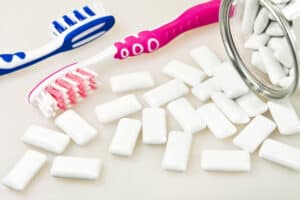 You’ve probably seen that one Trident commercial, right? It says “4 out of 5 dentists recommend Trident sugarless chewing gum,” and then it cuts to the fifth dentist, usually in some kind of awkward situation where he has to yell “no!” Of course, the implication is that he’d say yes — because Trident is obviously good for your teeth.
You’ve probably seen that one Trident commercial, right? It says “4 out of 5 dentists recommend Trident sugarless chewing gum,” and then it cuts to the fifth dentist, usually in some kind of awkward situation where he has to yell “no!” Of course, the implication is that he’d say yes — because Trident is obviously good for your teeth.
That’s a commercial, but they didn’t make up that statistic. What’s the truth about sugarless chewing gum, and is it really as good for you as the commercials want you to think?
Gum is pretty inoffensive in its natural state. There are no carbs or protein to think of, though regular gum will have more calories than its sugarless counterpart. There’s nothing remarkable about gum — until you start chewing it. Suddenly, you have something very sticky.
Well, when you’re chewing gum, you’re actually working up a lot more saliva (spit) than you might otherwise. In turn, your saliva (spit) and movement of your tongue helps remove food build-up and bacteria from your teeth and reduces plaque. Some studies have even shown that if you chew gum for 15 minutes right after you finish eating, it helps with tooth decay. While this isn’t strictly about your teeth, gum can improve your breath, especially after eating garlic.
It’s important to remember that the mentioned benefits reference sugarless gum. While regular gum would work in a similar way, the presence of sugar would only help create plaque and tooth decay. It’s not hard to find sugarless gum, though — many grocery stores stack it right next to the check out!
There are negatives to chewing gum, though, even the sugarless kind. For one, chewing gum is a repetitive motion — and if you’re working your jaw over and over, you’ll start to feel it. A sore jaw sounds silly, but it’s not fun, and it can lead to more serious issues down the road. In addition, chewing gum can suppress your body’s natural hunger pains and is often used as a diet trick. It’s a good idea in theory, but a study revealed people were more likely to go for the junk-food option, because their bodies were telling them they needed more calories. The more junk food consumed, the greater the chance of cavities.
As with the benefits, the negative side-effects of gum tend to be slow to occur, and because of that, it’s hard to give a definitive answer on chewing gum. We know that if you really want to chew gum, it should be sugarless — and that like everything else, you should do it in moderation. If you really want to take care of your teeth, though, stick to a brushing and flossing routine.
